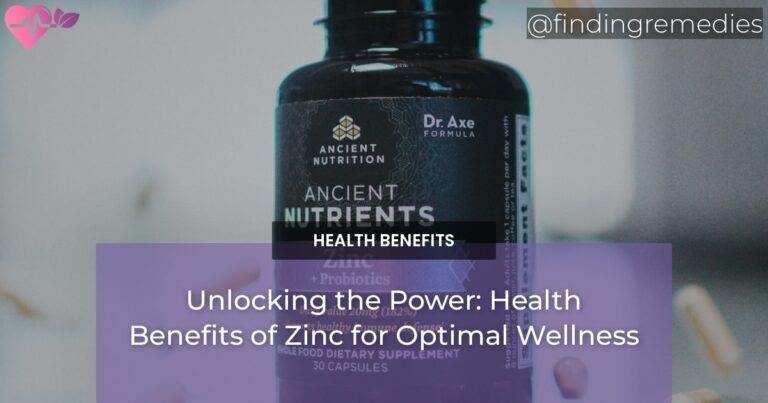Health Benefits of Zinc: Foods as Medicine
Zinc is an essential mineral that plays a critical role in a wide range of bodily functions. Zinc benefits the body in numerous ways, including supporting immune function, promoting cardiovascular health, and aiding in wound healing. This article explores the health benefits of zinc and its potential risks, specifically for its role in immune function.
Zinc and Immune Function
Zinc as a Gatekeeper of Immune Function
Zinc is a critical player in the immune system, where it acts as a gatekeeper of immune function. It has been found to be essential for the development and function of immune cells such as T-cells, B-cells, and natural killer cells.
Biological Basis of Altered Resistance to Infection
Studies have shown that zinc deficiency can lead to altered resistance to infection, impaired immune function, and an increased risk of infectious diseases. Zinc supplementation has been found to improve immune function and reduce the incidence and severity of infections.
ALSO READ
Mechanisms of Host Defense
Zinc is also involved in the mechanisms of host defense, including the release of cytokines, the regulation of inflammation, and the activation of enzymes involved in DNA synthesis and cell division.
Correlation between Zinc Status and Immune Function in the Elderly
The elderly are particularly susceptible to zinc deficiency, which can lead to impaired immune function and an increased risk of infections. Supplementing with zinc has been found to improve immune function and reduce the incidence and duration of infections in the elderly.
Zinc and Other Health Benefits
ALSO READ
Overview of Zinc
Zinc is an essential mineral that is needed in small amounts for various bodily functions. It is involved in a range of processes, including DNA synthesis, cell division, immune function, and wound healing.
Essential Interrelation of Zinc and Immunity
Zinc and immunity are closely interrelated, with zinc playing a critical role in the development and function of immune cells.
Zinc Requirements and the Risks and Benefits of Zinc Supplementation
Zinc requirements vary depending on age, sex, and other factors. While zinc supplementation can be beneficial for some, it can also have risks and should be taken under the guidance of a healthcare professional.
Zinc Against Common Cold Viruses: An Overview
Zinc has been found to be effective against common cold viruses, with studies showing that it can reduce the severity and duration of cold symptoms.
Effects of Cooking and Proper Storage on Zinc Content
Cooking and storage can affect the zinc content of foods, with some cooking methods and storage conditions leading to a loss of zinc. It is important to store and cook foods properly to maintain their zinc content.
Risks and Disadvantages of Zinc
Varieties and Types of Zinc
There are various types of zinc supplements available, including zinc gluconate, zinc acetate, and zinc sulfate. These supplements differ in their bioavailability and effectiveness.
Disadvantages of Zinc Supplementation
Zinc supplementation can have side effects such as nausea, vomiting, and diarrhea. It can also interact with certain medications, including antibiotics and diuretics.
Toxicity of Zinc and Risk Factors
Excessive zinc intake can lead to toxicity, which can cause symptoms such as abdominal cramps, vomiting, and diarrhea. Certain populations, including pregnant women and individuals with certain medical conditions, may be at higher risk of zinc toxicity.
Can Donating Blood Impact Zinc Levels and Overall Health?
Donating blood can positively impact the zinc levels and overall health benefits of donating blood. When you donate blood, your body works to replenish the lost blood, which can stimulate the production of new red blood cells and improve overall health. This process may also help maintain healthy zinc levels in the body.
Conclusion
Zinc is an essential mineral that plays a critical role in immune function and other bodily functions. While zinc supplementation can be beneficial for some, it can also have risks and should be taken under the guidance of a healthcare professional. Proper storage and cooking are important for maintaining the zinc content of foods.
Overall, zinc is an important nutrient that can offer numerous health benefits and support optimal wellness. Incorporating zinc-rich foods into your diet and consulting with a healthcare professional before taking supplements can help ensure that you are getting the right amount of zinc for your needs.
RELATED ARTICLES:

